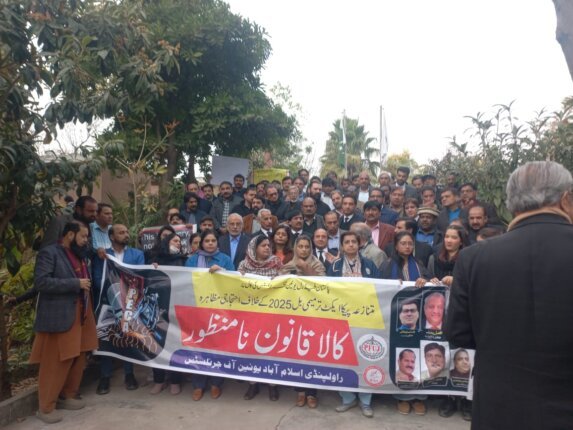ISLAMABAD: The Senate on Tuesday passed controversial amendments to the country’s cybercrime laws—the Prevention of Electronic Crimes Act (Peca) 2016—triggering nationwide protests by media bodies concerned that the changes could be used to suppress journalists.
The Prevention of Electronic Crimes (Amendment) Bill, 2025 introduces Section 26(A) to Peca, penalizing the dissemination of “fake news” online. Under the new amendment, individuals who intentionally spread, display, or transmit false information likely to cause fear, panic, or unrest in society may face up to three years in prison, a fine of up to Rs2 million, or both. The bill now awaits the president’s assent to become law.
Media Outcry and Opposition Criticism
Journalists have condemned the legislation as an “attack on freedom of expression,” while the opposition PTI accused the PPP, an ally of the ruling coalition, of hypocrisy for supporting the bill.
Following the Senate’s approval, journalists across Pakistan staged protests, pledging to continue demonstrations against the law.
The bill was introduced in the Senate by Minister for Industries and Production Rana Tanveer Hussain on behalf of Interior Minister Mohsin Naqvi. Journalists present in the Senate’s press gallery staged a walkout in protest, mirroring scenes from last week when the National Assembly passed the amendments.
PTI Senator Shibli Faraz criticized the bill, claiming it aimed to “target a specific political party.” He asserted, “Laws should be made to protect people, not to oppress them.”
Government’s Defense
In response, Minister Hussain insisted the bill was not aimed at journalists but rather at regulating social media. “This law will not deal with TV newspapers but social media,” he claimed, adding that the amendments could still be refined.
The Senate also passed the Digital Nation Bill, which now awaits presidential approval after its passage in the National Assembly. The Senate session was subsequently adjourned indefinitely.
Human Rights Concerns
Amnesty International has warned that the “draconian” Peca amendments would further restrict Pakistan’s already heavily regulated digital space. The Human Rights Commission of Pakistan (HRCP) echoed these concerns, warning that the law could be used to silence political workers, human rights defenders, and journalists.
PPP Hints at Future Amendments
After the bill’s passage, PPP Senator Sherry Rehman suggested further amendments to address journalists’ concerns. “We should hold consultations and bring [further] amendments,” she stated, acknowledging that the legislative process lacked prior discussion.
She emphasized that PPP supported media freedoms, adding, “The Peca law was flawed from the beginning.”
Nationwide Journalist Protests
Protests erupted in major cities, including Islamabad, Karachi, Lahore, Quetta, Faisalabad, Bahawalnagar, and Sukkur.

Demonstrators carried banners reading “Black law unacceptable” and “Peca Act not accepted.” In Faisalabad, some journalists wore handcuffs as a symbolic protest against what they called a crackdown on press freedom.
Pakistan Federal Union of Journalists (PFUJ) President Afzal Butt urged President Asif Ali Zardari to meet with the union’s Joint Action Committee to discuss concerns over the amendments. He also called on PML-N leader Nawaz Sharif to reconsider his party’s stance on the bill.
Meanwhile, PFUJ Secretary General Arshad Ansari warned the government against suppressing media freedoms. “If you attempt to silence journalists, we will escalate our protests,” he declared, vowing to challenge the amendments in court.
At a protest outside Karachi Press Club, senior journalist Mazhar Abbas criticized Peca’s expansion, stating that digital media had been a target since the law’s inception in 2016. He insisted that the government was not combating “fake news” but rather curbing the dissemination of critical reporting.
Proposed Changes to Peca
The bill introduces Section 26(A) to Peca, which penalizes the intentional dissemination of false or misleading information that could incite fear or unrest. It proposes the dissolution of the FIA’s Cybercrime Wing and the establishment of a National Cyber Crime Investigation Agency (NCCIA) to handle online offenses.
Additionally, a Social Media Protection and Regulatory Authority (SMPRA) would be formed to oversee digital content, with powers to block material deemed contrary to Pakistan’s ideology or critical of state institutions. The amendment also proposes a Social Media Complaint Council and a Social Media Protection Tribunal to enforce its provisions.
Concerns over Digital Nation Bill
The Senate also passed the Digital Nation Pakistan Bill, 2024, which seeks to centralize citizens’ social, economic, and governance data to facilitate a digital economy. Critics, including Amnesty International, have raised concerns about the bill’s implications for digital privacy and potential government surveillance.




